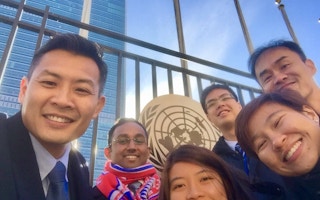The head of Singapore’s national coordinating body for youth affairs has said that young people need to be patient as they push for climate action, because reducing greenhouse gas emissions in the city-state is “complicated by social issues”.
To continue reading, subscribe to Eco‑Business.
There's something for everyone. We offer a range of subscription plans.
- Access our stories and receive our Insights Weekly newsletter with the free EB Member plan.
- Unlock unlimited access to our content and archive with EB Circle.
- Publish your content with EB Premium.
Speaking at an event themed on how young people can deal with climate anxiety on Friday, David Chua, National Youth Council (NYC)’s chief executive, said that Singapore is serious about climate action, but its leaders are also concerned about a just transition and want to shift to a low-carbon economy without leaving elements of society reliant on fossil fuels behind.
There is a need for more “brokerage” between environmental activists and the government, in working on decarbonisation efforts, Chua said.
“A lot of you are activists, but we need more people to be brokers,” he told the young audience at the event, noting that the work of being a broker, or being a bridge between different stakeholders, requires patience.
Singapore climate targets — to reach peak emissions by 2030, to halve emissions from that peak by 2050, and to achieve net-zero some time after 2050 — have been rated as “critically insufficient” to meet the Paris Agreement goals by policy research group Climate Action Tracker (CAT). If all countries were to follow Singapore’s approach, warming could reach up to a catastrophic 4 degrees Celsius, according to CAT’s assessment.
The government has said that the analysis “lacks nuance” and overlooks factors such as Singapore’s limited access to renewable energy and its high population density. At the COP26 climate talks in November, youth groups called on the government to make bolder climate commitments in line with the Paris Agreement, which aims to limit global warming to 1.5°C.
“
I will be the first to say that we are short in our targets [towards meeting the Paris Agreement]. We are well short. But you need to give us some space.
David Chua, CEO, National Youth Council
Chua told his audience on the Youth4climate webinar, co-hosted by real estate firm City Developments Limited and youth group Singapore Youth for Climate Action, that Singapore takes a conservative approach to target-setting and that is why it usually “underpromises”.
“We need to make sure that, as a whole, society moves along, and that is why we ask young people to be patient [for more ambitious climate action],” he added.
Chua’s comments come a week after a coalition of students from four of Singapore’s top universities launched a campaign rallying against the involvement of fossil fuel firms in higher education. The group is calling for Singapore’s universities to divest from fossil fuel firms, and stop big polluters from influencing the education system and the way universities are run.
The former army colonel, who was appointed as the first CEO of the NYC in 2015, after the institution restructured into an autonomous agency under Singapore’s ministry of youth, did not, however, make specific reference to the anti-fossil fuel campaign.
“I know [what we do] is never good enough, and I will be the first to say that we are short in our targets [towards meeting the Paris Agreement]. We are well short. But you need to give us some space,” he said.
Chua said that the Singapore government is mindful of how its climate targets compare against other countries. “We are not saying that we do not want to accelerate the targets,” he said, reiterating that Singapore had pledged to achieve net-zero emissions “as soon as it is possible” in the second half of the century.
Singapore’s economy is highly dependent on the carbon-intensive oil and gas sector. Oil majors such as Shell and ExxonMobil operate their largest refineries in Singapore, and the city-state is more reliant on fossil fuels for energy than most countries, according to a July study by an energy tariff comparison platform. Almost all (98 per cent) of its energy supply comes from traditional fuel sources.
This article has been edited to clarify NYC’s position on their youth outreach for climate action. Paragraphs 3 and 4, originally further down in the story, have been shifted up.








